Baba ganoush, a delectable Middle Eastern dip crafted from roasted eggplants, is renowned for its smoky, savory, and subtly tangy flavor profile. However, occasionally, this culinary delight can take an unexpected turn, leaving you with a bitter aftertaste that mars its otherwise harmonious symphony of flavors. If you find yourself perplexed by this culinary conundrum, fret not, for we embark on an investigative journey to unravel the enigmatic reasons behind baba ganoush’s bitterness and equip you with the culinary wisdom to prevent this culinary misstep in the future.
The Culprit: Eggplant’s Natural Bitterness
The primary culprit behind baba ganoush’s bitterness lies within the eggplant itself. Eggplants, members of the nightshade family, naturally harbor varying degrees of bitterness, a characteristic attributed to the presence of compounds known as cucurbitacins. These compounds, while not inherently harmful, can impart an unpleasant bitterness to the fruit if present in excessive concentrations.
Several factors influence the bitterness levels in eggplants, including:
-
Variety: Different eggplant varieties exhibit varying degrees of bitterness. Some varieties, such as the Japanese eggplant, are known for their inherent sweetness, while others, like the globe eggplant, tend to be more bitter.
-
Age: Younger eggplants generally possess lower levels of bitterness compared to their mature counterparts. As eggplants ripen, the cucurbitacin content increases, leading to a more pronounced bitterness.
-
Growing conditions: Environmental factors, such as drought stress or nutrient deficiencies, can also contribute to increased bitterness in eggplants.
Identifying Bitter Eggplants: A Preemptive Measure
To prevent bitter baba ganoush, it’s crucial to select eggplants with low bitterness levels. Here are some telltale signs to watch out for:
-
Size: Opt for smaller, younger eggplants. Larger, more mature eggplants tend to be more bitter.
-
Shape: Choose eggplants with a firm, smooth texture and avoid those with wrinkles or blemishes.
-
Color: Look for eggplants with a deep, vibrant purple skin. Avoid eggplants with pale or faded skin, as these may indicate over-ripeness and increased bitterness.
Culinary Strategies to Tame Bitterness
If you find yourself with a bitter eggplant, don’t despair. Several culinary techniques can help mitigate the bitterness and restore harmony to your baba ganoush:
-
Salting: Salting the eggplant slices before roasting draws out excess moisture along with some of the bitter compounds. Sprinkle salt liberally over the eggplant slices and allow them to rest for 30 minutes before patting them dry.
-
Roasting: Roasting the eggplant over high heat caramelizes the natural sugars and intensifies the smoky flavor, counteracting the bitterness. Roast the eggplant until the skin is charred and the flesh is tender.
-
Peeling: Once roasted, remove the eggplant’s skin. The skin often harbors a higher concentration of bitter compounds.
-
Adding sweetness: Incorporating sweet ingredients, such as honey, maple syrup, or pomegranate molasses, can balance out the bitterness. Add these sweeteners gradually, tasting as you go, to achieve the desired sweetness level.
-
Acid: A touch of acidity, from lemon juice or vinegar, can help brighten the flavors and reduce the perception of bitterness.
Additional Tips for Baba Ganoush Perfection
Beyond addressing bitterness, here are a few additional tips to elevate your baba ganoush to culinary excellence:
-
Use high-quality ingredients: The quality of your ingredients directly impacts the final product. Opt for fresh, flavorful eggplants and top-notch tahini.
-
Roast the eggplant thoroughly: Proper roasting is essential for developing the smoky, caramelized flavors that define baba ganoush. Roast the eggplant until the flesh is tender and slightly charred.
-
Season to taste: Taste your baba ganoush throughout the preparation process and adjust the seasonings accordingly. Add more salt, lemon juice, or sweetness as needed to achieve the perfect balance of flavors.
-
Serve with accompaniments: Baba ganoush pairs wonderfully with pita bread, vegetable crudités, or grilled meats. These accompaniments provide a delightful contrast in texture and flavor.
The occasional bitterness in baba ganoush is a culinary hurdle that can be easily overcome with the right knowledge and techniques. By understanding the factors that contribute to bitterness and employing the strategies outlined above, you can consistently craft baba ganoush that delights your taste buds and leaves you craving more. Remember, cooking is an ongoing journey of exploration and experimentation. Embrace the occasional culinary misstep as an opportunity to learn and refine your culinary skills.
How to Make Baba Ghanoush
Here’s what you need to do: prepare your pita bread for dipping, since we’re going to be making baba ghanoush!
Prepare. Preheat oven to 400°F/200°C.
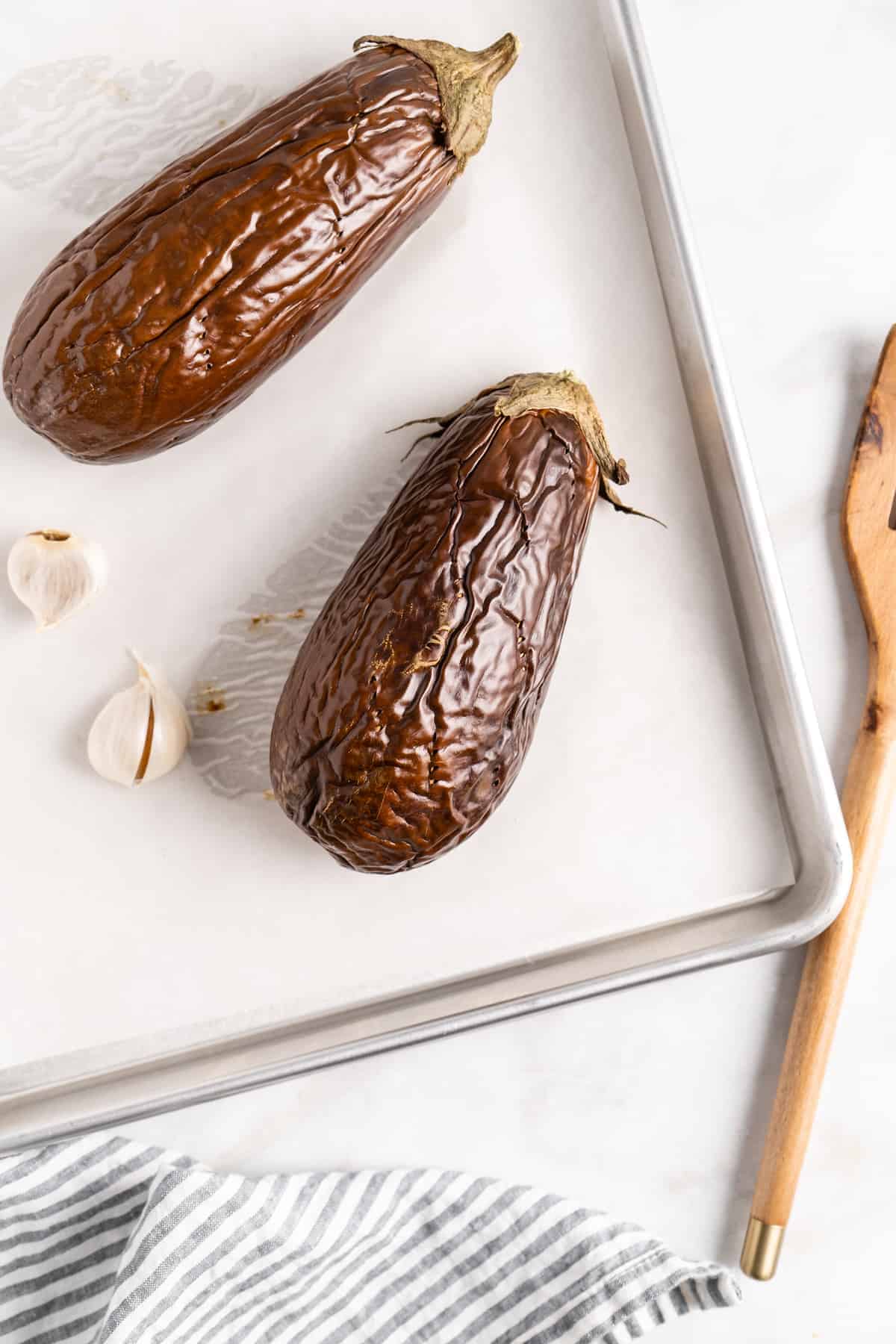
Roast the eggplants. Using a fork, pierce the eggplants and arrange them alongside the garlic on a baking sheet. Roast the eggplants for 30 to 40 minutes, or until they are soft and have wrinkled skin.
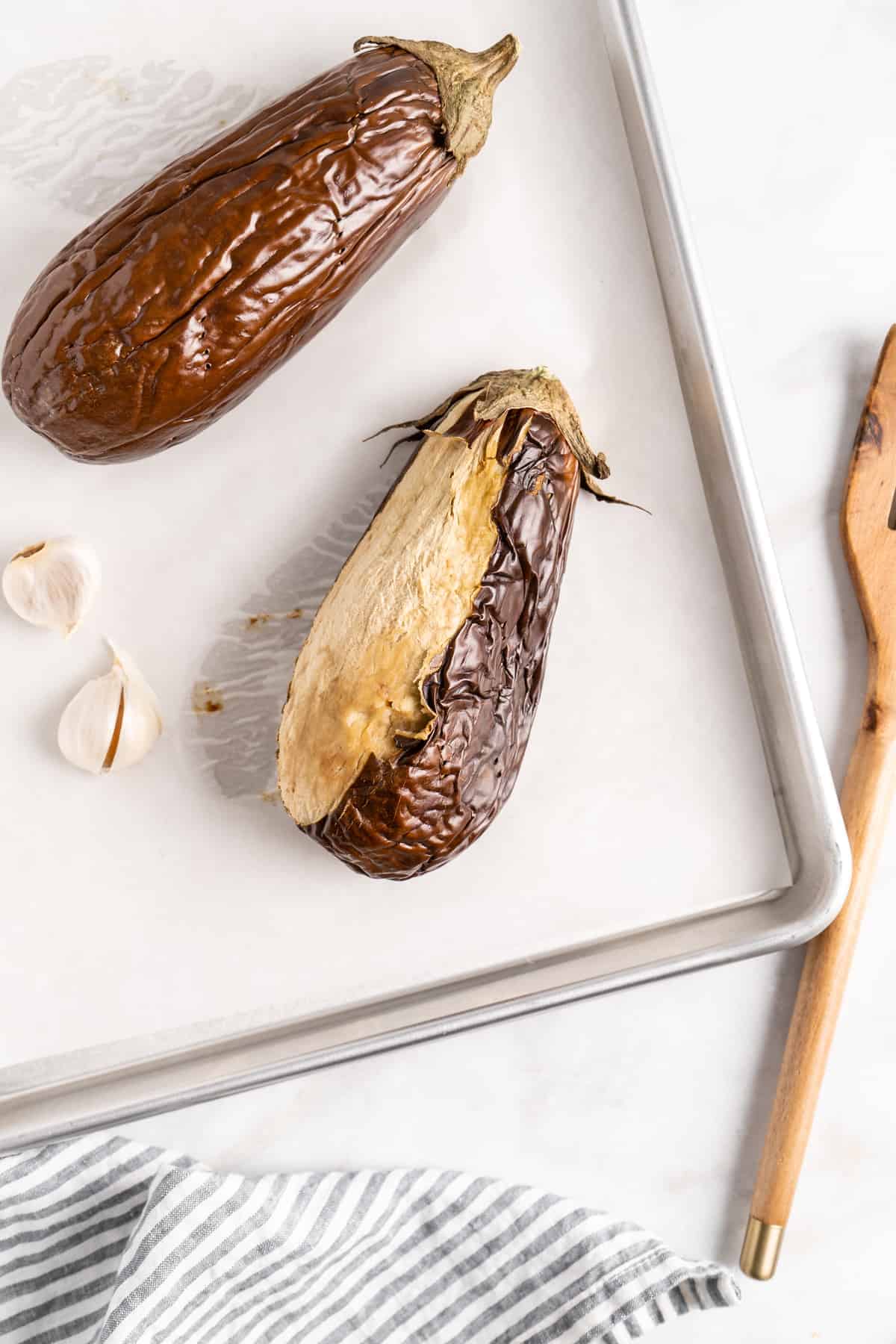
Cool and prepare the eggplant. After allowing the eggplants to cool for five to ten minutes, cut off the stem and peel the skin. After letting the excess moisture drain off for five minutes, place the eggplant in a colander and press it with a wooden spoon or spatula to remove any leftover liquid.
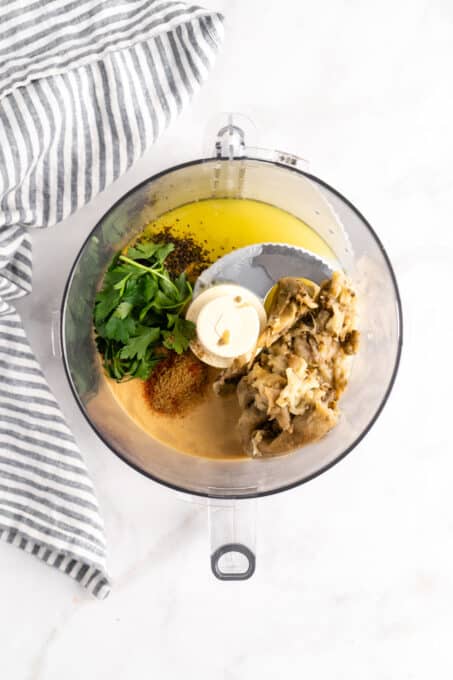
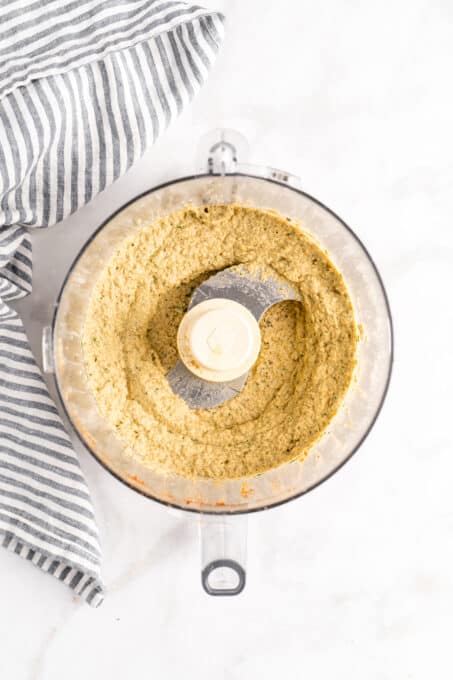
Puree. In a food processor, combine the eggplant, tahini, lemon juice, smoked paprika, parsley, cumin, roasted garlic, sea salt, and olive oil. Process until smooth. Taste and adjust the seasonings as desired.
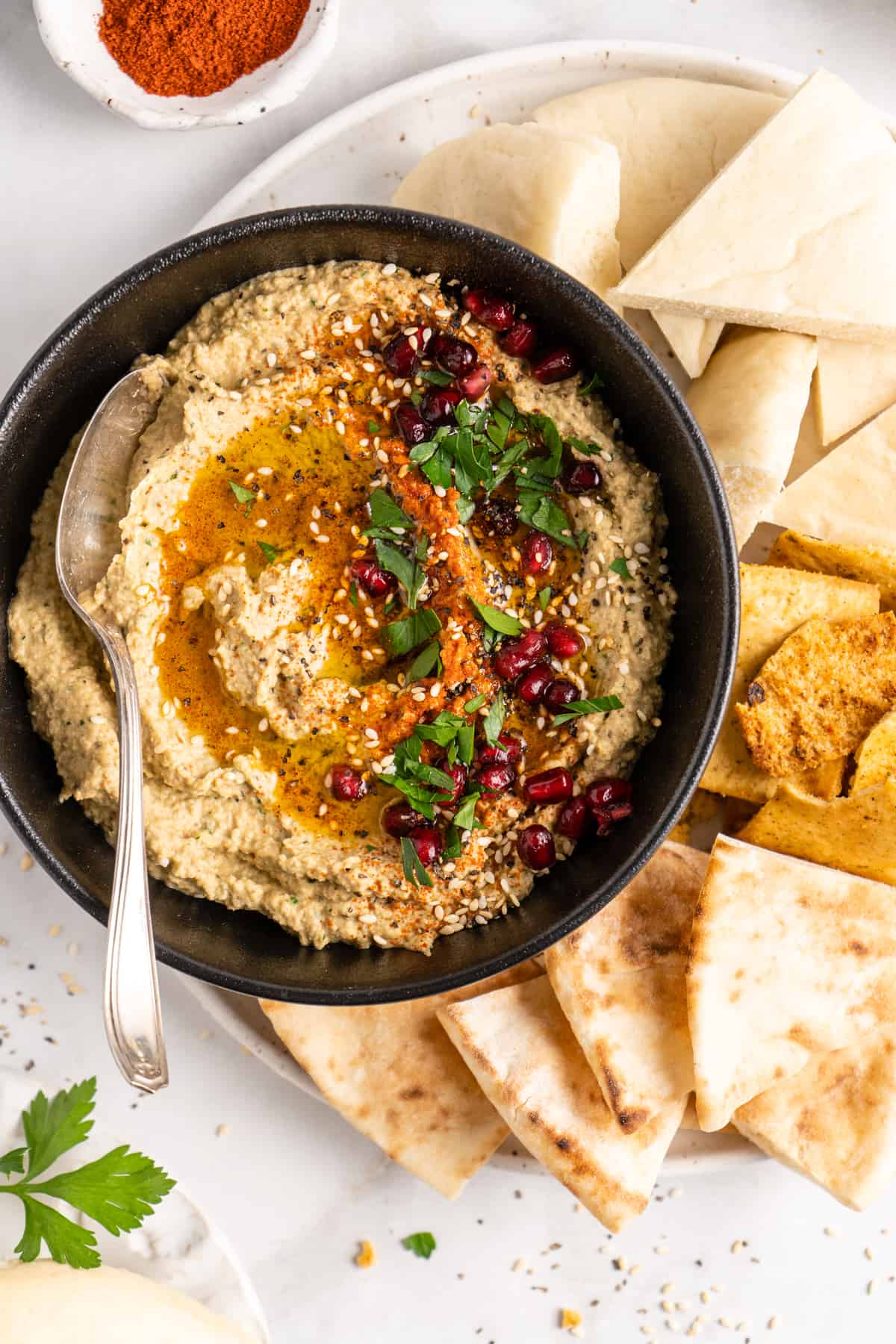
Serve. Once the baba ghanoush is done, transfer it to a serving bowl and top with chopped parsley and olive oil. Serve with crudités, fresh pita bread, or pita chips.
These pointers will assist you in creating the ideal baba ghanoush at home.
- Dealing with a bitter eggplant. You can counteract the bitterness of your eggplant by using some maple syrup or pureed dates.
- Peeling the eggplants. Sometimes the eggplant doesn’t peel after roasting. That’s alright, simply cut the eggplants in half lengthwise and remove the flesh.
- Amping up the garlic flavour. If you prefer a stronger garlic flavor in your dip, you can omit roasting the garlic.
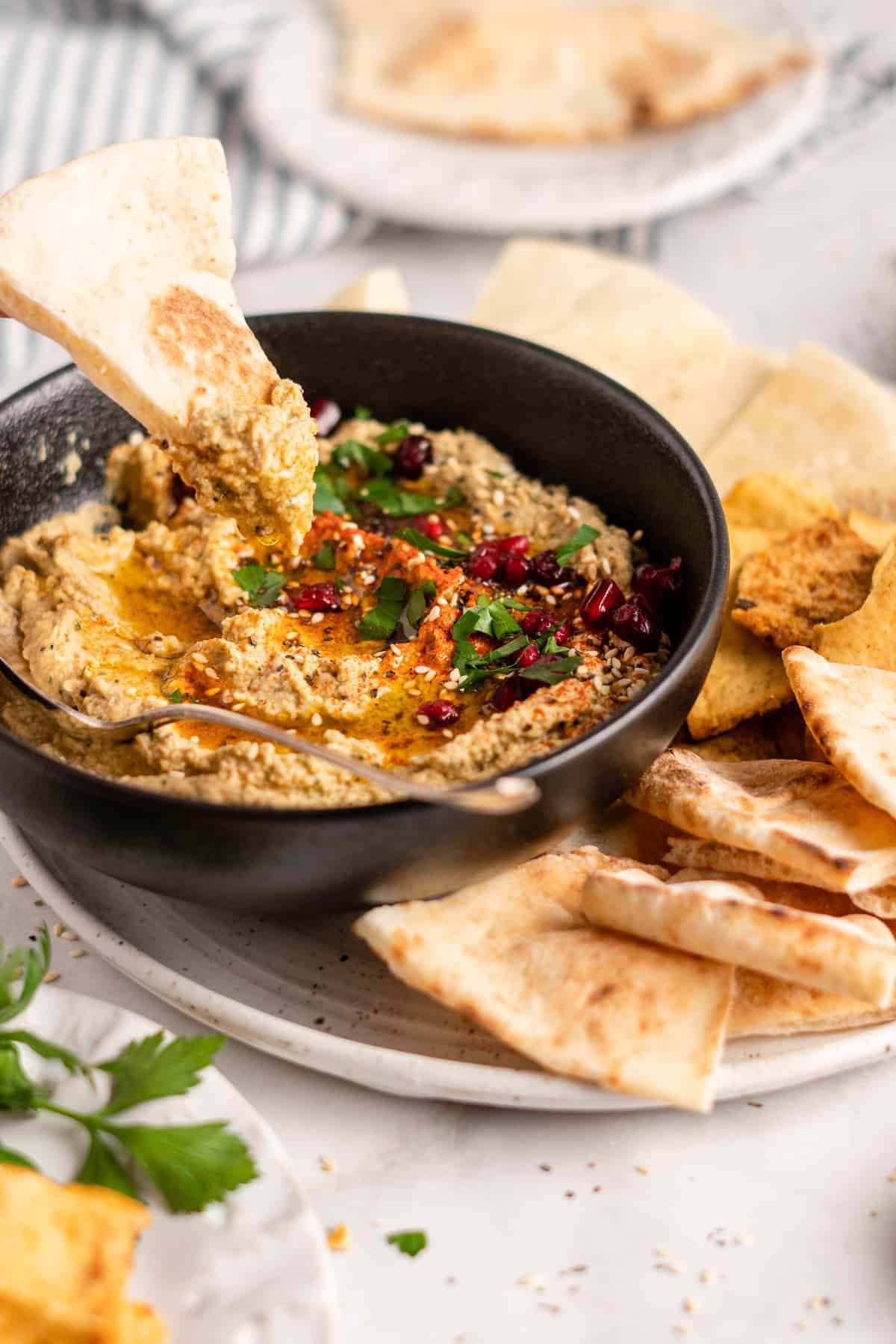
Eat the baba ghanoush within three to four days after refrigerated in an airtight container. It’s eaten cold, so there’s no need to reheat!.
Tips for Choosing Eggplants
Since eggplant isn’t the most popular vegetable at the grocery store, it occasionally sits there for a very long time before you decide to buy it. Getting a fresh eggplant is important because older ones can impart a bitter flavor. The skin should be firm all over with no soft spots, and it should be shiny rather than dull. The stem should be green rather than brown and dry, and it should feel heavy for its size. Buying several smaller eggplants is always preferable to purchasing one large one because the smaller ones are less likely to be bitter.
5 tips for making the BEST Baba Ganoush
FAQ
Why does my eggplant taste bitter?
Why does baba ganoush taste bad?
How do you pick an eggplant that is not bitter?
What is baba ganoush supposed to taste like?
Why is my Baba Ganoush bitter?
If your Baba Ganoush is bitter, eggplant is usually the culprit! But not to worry, I have several tips to share. If your garlic isn’t the freshest and has started to grow a green sprout in the center (which is known the garlic germ), cut your garlic cloves in half and remove it. These can be quite bitter!
Is baba ghanoush bitter?
My Baba Ganoush is bitter! Baba Ganoush (Baba Ghanoush) is a thick, creamy Middle-Eastern dip, spread or sauce made from pureed or mashed eggplant (aubergine/brinjal) flavored with tahini, lemon juice, garlic and other seasonings.
Does Baba Ganoush have eggplant?
Baba Ganoush may look intimidating at first glance, mostly because it contains eggplant, which can sometimes come out bitter or soupy if prepared incorrectly. But when you master cooking with eggplant, this dish, which stars roasted or grilled eggplant, comes out creamy, smokey, and oh-so-delicious!
What is the difference between mutabbal and baba ganoush?
Both Mutabbal and Baba Ganoush (or Baba Ghanouj) have the same base of grilled eggplant, but they differ slightly in the other ingredients that are used in the individual recipes. While Mutabbal has only grilled eggplant, tahini, olive oil, and garlic, Baba Ganoush has chopped tomato and pomegranate molasses added to it.
